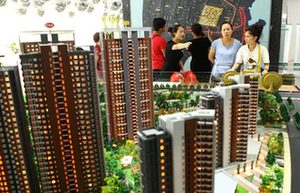Why the loosening?
Analysts say local governments have appeared to be more motivated than developers to reverse the cooling trend.
Local governments gross a big chunk of their revenue by selling land to developers, so they are understandably inclined to step in and help developers unload existing properties.
 |
 |
A report from the Development Research Center under the State Council, China's cabinet, showed that land sales account for 60 percent of local government's extra-budgetary revenues.
Frank Chen, executive director at property research firm CBRE, said the fact that many governments have reversed the property curbs shows that they have grown too reliant on land sales for revenue. Chinese economic growth has already ticked down, and if the property market remains sluggish, it will take a heavy toll on the coffers of local governments.
They went on a building spree after the central government doled out cheap credit to keep the Chinese economy afloat in the wake of the global financial crisis. Many cities that managed to shore up their local economy through the real estate boom are now brooding over rows of empty apartments.
Will this work?
Loosening might not bring the hoped-for immediate impact, but it will surely prevent the property bubble from growing bigger as prospective buyers remain on the sidelines, according to Zhu Zhongyi, vice-president of the China Real Estate Industry Association.
